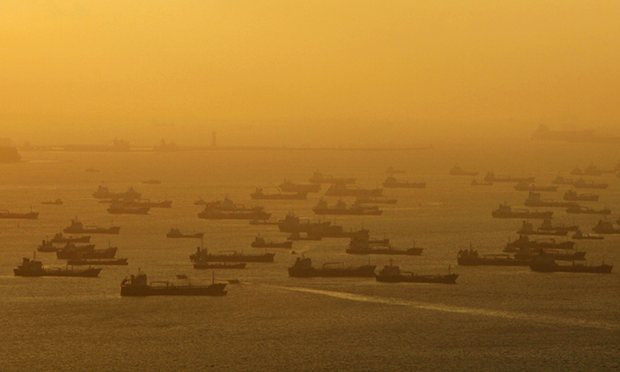Delay to curbs on toxic shipping emissions ‘would cause 200,000 extra premature deaths’

A push by the shipping and oil industries for a five-year delay to curbs on toxic sulphur emissions would cause an extra 200,000 premature deaths from lung cancer and heart disease, according to an unpublished International Maritime Organisation (IMO) study. Fatalities from illnesses such as asthma were not covered by the leaked paper, which was based on shipping satellite data and modelling work. The shipping industry is by far the world’s biggest emitter of sulphur with SOx levels in heavy fuel oils up to 3,500 times higher than those in current European diesel standards for vehicles. A single large cruise ship can reportedly burn as much fuel as whole towns, and emit more sulphur than 7m cars. At the end of October, an IMO meeting in London will decide whether to cap the sulphur content of shipping fuels by 2020 or 2025. Current levels can reach 3.5% but the cap would limit them to 0.5%. The 2020 deadline faces fierce resistance from the oil and gas industry association, IPIECA, and Bimco, a global shipping group, which argue that there is not enough low-sulphur fuel available to meet the global demand that the measure would spur. The EU has thrown its weight behind 2020, unilaterally imposing the new IMO standard from then. With China enforcing similar emissions control zones, the new benchmark for 2020 is thought likely to pass, although the US and large flag states’ positions remain wildcards. James Corbett, one of the report’s lead authors, told the Guardian that any slippage on the 2020 start date risked grave consequences. “An IMO policy implemented on time in 2020 could reduce the health burden on coastal communities, particularly in Asia, Africa and Latin America,” he said. “The inverse is also true. A delay would ensure that health impacts from sulphur emissions persisted in coastal communities that are exposed, where shipping lanes are most intense and communities most densely populated.” Egypt, Panama, Japan, India, Singapore, the Philippines and China would be among the countries hardest hit, Corbett added. Sveinung Oftedal, Norway’s lead negotiator at the IMO, said that domestic health concerns had now overtaken fears about the acidifying effects that sulphur has on Scandinavia’s lakes and river. “Air pollution from shipping is not just a local or regional, but a global, problem,” he said. “The question is whether we can really continue to accept its effects, and the answer is: no, we cannot. The 2020 deadline is needed and it is achievable.” But resentment in the beleaguered shipping trade is unmistakeable, and a sign of future fights to come in the IMO over shipping’s CO2 emissions, which roughly equal those from aviation. “Most shipping companies are not turkeys voting for Christmas,” an industry source said. “They’re under the impression that a decision to delay to 2025 would be of collective economic benefit. In the real world, shipowners are bleeding money. There is total depression in the industry.” Thousands of container ships belonging to Hanjin, south Korea’s biggest shipping firm, were left adrift on the world’s oceans carrying a £14bn cargo, after the firm filed for bancruptcy last month. The International Chambers of Shipping (ICS) says that imposing the new benchmark in 2020 would cost industry an additional $50-100bn a year, owing to the cost of low-sulphur fuels. Ships today mostly run on cheap blends of the residues and remainders left over from the refining and distillation of crude oil for aircraft jet fuel and automobile diesel. Bimco argues that a premature move to low-sulphur fuels could have knock-on inflationary effects for other fuels, as increased diesel demand overwhelms supply.

